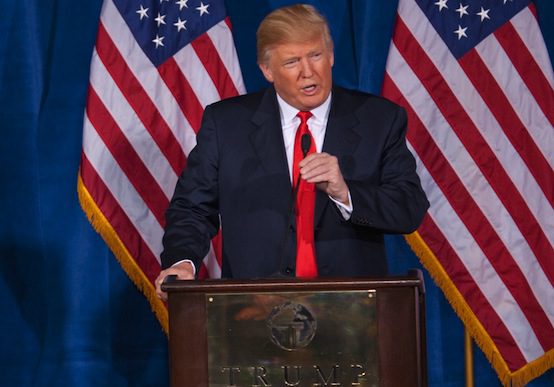Donald Trump’s Napoleon Moment

Patrick Buchanan gets right to the core of the phenomenon called Donald Trump with his headline, “The Rebirth of Nationalism.”
Because of America’s two-party system and the dominance of individualistic libertarians and social conservatives in one party and left-egalitarians and interest-group liberals in the other, we forget the basics. As the late great political scientist Aaron Wildavsky taught us years ago there are four fundamental political types: egalitarians, individualists, social conservatives, and—the ones we forget about—what he called “fatalists.”
We tend to forget the fatalists because they tend not to vote. They view the world as foreign, chaotic, ephemeral, dangerous, on the edge of falling into bedlam. He used the analogy that their world is like a marble rolling unsteadily on a glass surface, rolling and pitching who knows where. Government has some control but is run by an untouchable, all-powerful elite acting in its own interest. Such a world can only be tamed by something enormously powerful and masterful, and only during a crisis. Then a strong central government supported by angry, patriotic nationalists and led by a popular Napoleon on his white horse can arrest the anarchy. Trump’s autobiography is titled Think Big and Kick Ass.
Buchanan tapped into the same world—although with vastly more intellect and subtlety—but he learned Wildavsky’s lesson. Fatalists do not vote, except perhaps enough to win a primary or two, and the elite strike back hard. It is difficult to sustain the anger, although Buchanan came closer than many remember. Trump may turn out to be more fortunate since popular resentment has risen to a boil this time. Bernie Sanders taps into it too, and when fatalists do vote they might go for either party. But the Vermont socialist has no horse; Trump has billions and the celebrity, willingness, and audacity to ride them.
Pollster Frank Luntz came reeling out of one of his distinctive focus groups the other day crying “my legs are shaking” from seeing the depth of commitment of the Trump supporters he interviewed at the session. “I want to put the Republican leadership behind this mirror and let them see. They need to wake up. They don’t realize how the grassroots have abandoned them. Donald Trump is punishment to a Republican elite that wasn’t listening to their grassroots.” He even showed the audience unflattering images of and statements by Trump meant to turn them off. It did not work. At the end they were more committed than at the beginning.
Political analyst Tom Charles Huston predicts the establishment Republican presidential candidates will sputter—Trump quipped Jeb Bush puts his audiences to sleep—and the business “donor class” elite will desert them, happy to support Hillary or Joe Biden to advance their crony capitalism rather than moving to a conservative with an edge who might be able to confront Trump—and them.
If Trump wins Iowa and New Hampshire, it is difficult to see any opponent who could rally South Carolina two weeks later, or Nevada. Then on March 1 a half-dozen Southern states with many fatalists (remember Huey Long) will split the opponent’s ranks further. On March 15 Bush could be ousted by Marco Rubio in Florida, with John Kasich winning by a smaller than expected margin in Ohio. Trump could win by losing, saying they were only favorite sons. No one would be left anyway. If he wins either state, it is all over.
So what was impossible a few weeks ago now becomes a real possibility.
The willfully blind establishment in Italy did not think Benito Mussolini or even Silvio Berlusconi could win, either; both succeeded because the reasonable right floundered. The latter became prime minister three times. How does President Trump sound? Or President Hillary?
Donald Devine is senior scholar at the Fund for American Studies, the author of America’s Way Back: Reclaiming Freedom, Tradition, and Constitution, and was Ronald Reagan’s director of the U.S. Office of Personnel Management during his first term and one of his campaign strategists.
Comments